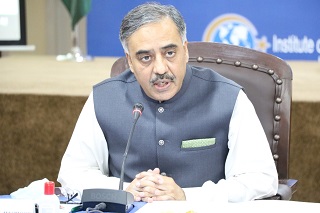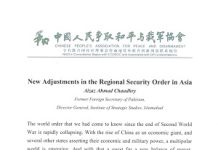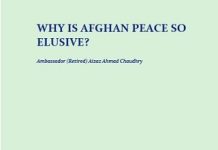Remarks by Foreign Secretary Sohail Mahmood at the Experts Dialogue on “Pakistan-ASEAN: Shared Future and the Way Forward” on 1 July 2021 Institute of Strategic Studies, Islamabad

Ambassador Khalid Mahmood, Chairman ISSI,
Ambassador Aizaz Ahmad Chaudhry, Director General, ISSI
Ambassador Adam Tugio
Ambassador of the Republic of Indonesia/Chairman ASEAN Committee, Ibd
Excellencies/Head of ASEAN Missions
Distinguished Experts and Participants
Assalam-o-Alaikum!
Let me begin by thanking the Institute of Strategic Studies and the Indonesian Embassy for this initiative to co-organize today’s Experts Dialogue. My special thanks to Ambassador Tugio for his valuable efforts.
Pakistan’s relations with ASEAN, and how we can work together for a shared future, is an important conversation.
It is heartening that many experts, including from the ASEAN region, will be contributing to this Dialogue.
These deliberations will undoubtedly offer new insights on further deepening and enriching the Pakistan-ASEAN relationship.
ASEAN has come a long way since its inception in August 1967. The dim outlook of the 1960s contrasts sharply with the high performing and buoyant dispensation of the ASEAN region today.
Indeed, ASEAN has transformed into a vibrant 10-member Organization, an increasingly integrated economic community, and a central pillar of regional architecture.
With an overall GDP of more than 3 trillion USD, ASEAN is now the 5th largest economy in the world, and on track to become the 4thlargest by 2050.
ASEAN is also the leading destination of foreign direct investment and the most successful regional economic integration initiative in the developing world.
Taking a step further in November 2020 at the 37th ASEAN Summit, ASEAN and 5 trading partners signed the agreement on Regional Comprehensive Economic Partnership (RCEP).
ASEAN represents the finest examples of ‘open regionalism’. The way ASEAN’s farsighted leadership has forged dialogue and cooperation across the region and beyond, while also retaining ASEAN’s centrality, is truly remarkable.
ASEAN’s success as a regional organization, and East Asia’s undisputed economic potential have long been recognized. Countries from different parts of the globe wish to strengthen their engagement with ASEAN.
Pakistan is no exception!
In line with our “Vision East Asia” policy, Pakistan has worked assiduously to forge a closer partnership with ASEAN.
Over the past three decades, Pakistan-ASEAN relations have continued to grow.
Pakistan attained the status of Sectoral Dialogue Partner in 1993. The inaugural meeting of ASEAN-Pakistan Joint Sectoral Dialogue was convened in 1997 in Islamabad.
This Sectoral Dialogue Partnership covers a broad range of areas including: trade, industry, investment, environment, science and technology, combating drugs and narcotics, tourism, and human resource development.
Pakistan acceded to the Treaty of Amity and Cooperation in Southeast Asia on 2 July 2004 in Jakarta.
On the same day, Pakistan was also admitted as the 24th participant of the ASEAN Regional Forum (ARF).
ASEAN and Pakistan signed the Joint Declaration for Cooperation to Combat Terrorism on the sidelines of the 12th ARF Ministerial in 2005.
Mutual cooperation under the Sectoral Dialogue Partnership has been developing in diverse areas.
A number of cooperation projects have been completed with support from the ASEAN-Pakistan Cooperation Fund.
Some of these relate to fostering closer B2B linkages as well as facilitation of trade.
Today, our two-way annual trade is in the range of $7 billion. Both sides remain distinctly conscious that this is far below the real potential of Pakistan and ASEAN.
Tourism from Pakistan to ASEAN region has been on the rise in recent years. Pakistani students are increasingly looking for education opportunities in Universities in ASEAN countries.
In recent years, the size of Pakistani Diaspora has also grown in ASEAN countries.
Yet, it is also clear that our engagement across all areas of common interest has yet to reach the optimal level.
Excellencies/Distinguished participants,
Our desire to further strengthen cooperation with ASEAN stems, not just from economic considerations. It has compelling cultural logic as well.
Pakistan shares historical and geographical linkages with the region. We have commonality of faith with several members of ASEAN, and we share our ancient Buddhist heritage with the others.
Since medieval times, our lands have been connected through the sea. This connectivity was part of the larger enterprise of bringing West Asia, Middle East and Central Asia together with the East in a web of linkages in trade and commerce.
Infact, this connectivity helped exchange of big ideas and enabled Islam and other religious traditions like Buddhism to traverse the regions.
Distinguished participants,
ASEAN, the world and Pakistan are facing common challenges and uncertainties today — whether it be the global economic slowdown due to COVID-19; geostrategic competition at the global and regional levels; challenges to multilateralism; trans-national crime; disruptive technologies; climate change; environmental degradation; and marine debris.
The future prosperity of our peoples should not be held hostage to shifting geo-strategic interests.
Close partnerships remain crucial in enabling our regions, which span the Pacific and Indian Oceans, to tackle these challenges and advance the shared objectives of peace, progress and prosperity.
Distinguished participants,
Pakistan is resolved to upscale its engagement with ASEAN members — at both bilateral and institutional levels. This is also part of our shifting focus to geo-economics
We are working to further enhance political, economic, and socio-cultural links with all member states.
In trade, we encourage our experts to closely examine how Pakistan could benefit by engaging with Regional Comprehensive Economic Partnership (RCEP).
In investment, we encourage ASEAN member countries to consider participation in CPEC projects and invest in Special Economic Zones.
Most importantly, Pakistan’s commitment to expand cooperative ties with ASEAN is reflected in our desire to become Full Dialogue Partner (FDP).
The FDP status would Pakistan’s across-the-board engagement with the region. It would be a win-win for both sides as Pakistan would be the only FDP of ASEAN which would also be a member of SAARC, ECO and SCO.
While we pursue Full Dialogue Partnership, let us fortify our practical cooperation in areas identified in Pakistan-ASEAN Sectoral Dialogue Partnership. The following could be prioritized:
First, strengthen Pakistan-ASEAN connectivity in all domains. In transportation, communication, cyber and between our ports and among our peoples. This soft and hard connectivity will be mutually beneficial for Pakistan, ASEAN and even regions like Central and West Asia that are contiguous with Pakistan.
Second, support our business communities to comprehensively upgrade our economic cooperation as ASEAN countries move up on the value chain in manufacturing and services.
Third, focus on tourism as a low hanging fruit.
Fourth, explore avenues of cooperation in Science & Technology, IT and higher education.
Fifth, deepen our cultural exchanges. This will help generate awareness of what binds us together and how can we live in harmony in our diversity.
Let me conclude by encouraging members of diplomatic community and academia present here today to make full use of this forum to contribute ideas and suggest newer ways of raising Pakistan-ASEAN cooperation to a higher level.
I thank the organizers and participants again and wish them well in their deliberations. Thank you all!















